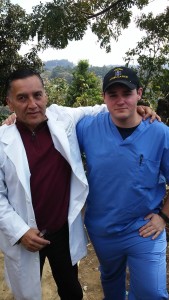by Aetna’s Tom Sopel
La Antigua, Guatemala — Hello, my name is Tom Sopel and I’m an EMT here at Aetna. This past January I flew to Guatemala to work under the Medical Humanitarian Society of Uconn in order to provide patient care to rural areas of Guatemala. The culture was as vibrant as it was care free, the kind of atmosphere that lets you slow your clock down and loosen up your laces. I guess you can say that an important medical lesson I learned out there was that the human body naturally wants to smile when it’s never been exposed to (Hartford) winter. But seriously, the place was amazing. We spent two weeks in various villages across Guatemala running health care clinics, working with hundreds of patients to provide much needed medical treatment for those in need.
Out there we were met by our friend and translator, Jorge Hernandez who helped us with organizing patient care sites and Dr. Rafael Vela, who was an amazing doctor who would volunteer his time to go with us out to the different villages and coffee plantations spotted across the jungles of Guatemala. We were able to assess patients and diagnose conditions under the guidance of Dr. Vela in addition to providing the medications they needed. Some places were better than others, ranging from ghettos that from a distance formed a sea of aged metal sheeting and cinder blocks to little shacks in the jungle with dirt floors. The people we saw on the coffee plantations were poor families who were either indigenous to the area or came from far away places for work.
These people all lived near the base of an active volcano, which was appropriately and lovingly named Volcán de Fuego. The volcanic ash, although great for the soil that the coffee grew in, wasn’t so good for the human eye, and caused conjunctivitis. In fact, ~3/4 people who lived in one particular village closest to the volcano suffered from the eye infection. Among other things, we were exposed to many cases of skin infections, muscle spasms (consistent coffee picking left people with kyphotic curvatures of the spine and painful shoulder and neck muscle spasms), migraines, intestinal issues, diabetes, UTI’s and scabies, among other things. We did what we possibly could, but when it came to prehospital care, we were it. One doctor and a handful of premedical students from Uconn…with hundreds of patients, armed with two huge suitcases full of a variety of medications and some ill fitting scrubs. Being an EMT, I spent most of my trip really trying to dig into the state of Guatemalan EMS, and trying to find out everything that I could.

